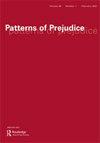朱塞佩·博泰,1938年的种族法与意德关系
IF 0.8
2区 社会学
Q4 ETHNIC STUDIES
引用次数: 0
摘要
摘要D’Elia的文章为Giuseppe Bottai处理所谓“犹太问题”这一有争议的问题提供了新的视角。众所周知,博泰在1938年《种族法》颁布时担任法西斯意大利国家教育部长,他坚定地致力于在教育部门严格执行这些法律。然而,考虑到他在1938年之前从未宣布支持反犹太主义,学者们对促使他批准意大利法西斯主义种族政策的原因没有达成共识。他的做法是由机会主义和私利决定的吗?也就是说,是出于不被政治边缘化的考虑吗?还是受到了纳粹圈子里流传的谣言的影响,这些谣言打算诋毁他是种族运动的反对者,甚至是犹太后裔?博泰对罗马-柏林轴心国的支持引发了类似的问题,因为他不是纳粹的同情者。做出这样的决定仅仅是出于政治考量吗?根据未发表的文件,这篇文章首先表明,纳粹官员将博泰视为宝贵的合作伙伴,并热衷于平息有关他所谓犹太血统的谣言;其次,就博泰而言,他并不不愿意在种族问题上与意大利德国盟友的代表合作,自1938年以来,他开始将种族主义视为加强意德关系的关键因素。此外,本文认为,博泰接受轴心国联盟和法西斯种族政策可以合理地解释为考虑到他以强烈的反资产阶级信仰为标志的左翼法西斯意识形态。他将墨索里尼政权的反犹太主义转变和意大利与德国的结盟视为振兴法西斯主义的机会,促使其走上革命和极权主义的道路。本文章由计算机程序翻译,如有差异,请以英文原文为准。
Giuseppe Bottai, the Racial Laws of 1938 and Italian–German relations
ABSTRACT D’Elia’s article casts new light on the controversial issue of Giuseppe Bottai’s approach to the so-called ‘Jewish question’. It is known that Bottai, serving as Fascist Italy’s Minister of National Education when the 1938 Racial Laws were enacted, worked determinedly for them to be rigorously implemented in the education sector. However, there is no consensus among scholars on the reasons that drove him to approve the racial policy of Italian Fascism, considering that he had never declared himself in favour of antisemitism before 1938. Was his approach dictated by opportunism and self-interest, that is, by the concern not to be politically sidelined? Or was it influenced by the rumours circulating in Nazi circles intending to discredit him as an opponent of the racial campaign, or even as being of Jewish descent? Bottai’s support of the Rome–Berlin Axis raises similar questions since he was not a Nazi sympathizer. Was such a decision made merely due to political calculation? Based on unpublished documents, this article shows, first, that Nazi officials regarded Bottai as a valuable partner and were keen to silence the rumours about his alleged Jewish ancestry; and, second, that Bottai, for his part, was not reluctant to cooperate with representatives of Italy’s German ally on racial issues and, since 1938, began considering racism a key factor in strengthening Italian-German relations. Moreover, this article argues that Bottai’s acceptance of the Axis alliance and the Fascist racial policy can reasonably be explained by taking into account his leftist Fascist ideology, marked by strong anti-bourgeois beliefs. He saw both the antisemitic turn of Mussolini’s regime and Italy’s alignment with Germany as opportunities to revitalize Fascism, driving it to embrace a revolutionary and totalitarian course.
求助全文
通过发布文献求助,成功后即可免费获取论文全文。
去求助
来源期刊

Patterns of Prejudice
Multiple-
CiteScore
2.50
自引率
0.00%
发文量
11
期刊介绍:
Patterns of Prejudice provides a forum for exploring the historical roots and contemporary varieties of social exclusion and the demonization or stigmatisation of the Other. It probes the language and construction of "race", nation, colour, and ethnicity, as well as the linkages between these categories. It encourages discussion of issues at the top of the public policy agenda, such as asylum, immigration, hate crimes and citizenship. As none of these issues are confined to any one region, Patterns of Prejudice maintains a global optic, at the same time as scrutinizing intensely the history and development of intolerance and chauvinism in the United States and Europe, both East and West.
 求助内容:
求助内容: 应助结果提醒方式:
应助结果提醒方式:


